 “The reach of Facebook paid brand posts is dropping.” That quote comes from Michael Fisher, president of Yes Lifecycle Marketing, whose company just released the results of a survey of more than 500 active social media users. According to the data, getting Facebook users to share information and deals about your products and services is far more important than you might realize.
“The reach of Facebook paid brand posts is dropping.” That quote comes from Michael Fisher, president of Yes Lifecycle Marketing, whose company just released the results of a survey of more than 500 active social media users. According to the data, getting Facebook users to share information and deals about your products and services is far more important than you might realize.
In total, 34% of active social media users have shared some kind of product offering with their followers and 94% of them have shared offers through Facebook (significantly higher than offer-sharing on Twitter and Pinterest, which had been done by 15% and 10% of the respondent audience, respectively).
For marketers, the gold in the data is how people react to seeing brand information and offers on social media sites. According to this survey, consumers are 23% more likely to make a purchase after seeing an offer that was shared by a friend or family member on a social media site than if they saw that offer as a sponsored post published by the brand on a social media site. Furthermore, they’re 55% more likely to make a purchase after seeing an offer shared by a friend or family member via social media than they would if they saw a display ad for the same brand on a social media site.
Brand Ambassadors vs. Affiliate Marketers
Before you run out and try to get more people to talk about your brand and share your brand offers on Facebook and other social media sites, you need to understand that developing brand ambassadors is very different from recruiting affiliate marketers.
While 40% of all social media users who responded to this survey indicated that they would be more likely to share brand offers and deals if they received some kind of incentive to do so, that incentive doesn’t have to be cash. To retain some level of authenticity among your online brand ambassadors, their followers shouldn’t view them as salespeople who are pushing your products and services in an effort to receive monetary compensation. Eventually, their followers will get tired of seeing repeated promotional posts and will stop paying attention to them.
Instead, consider incentives that reward their loyalty. Respondents to the survey said they would be most likely to share brand offers and promotional deals if they received a percent off of their own purchase (36%), money off of their own purchase (26%), or a buy-one-get-one free offer on their own purchase (17%). By rewarding loyalty rather than handing over cash, the brand ambassador’s evangelizing retains more of its authenticity.
Keep in mind, some brand ambassador programs are more successful than others simply because of the type of products or services being offered by the brand. The study found that social media users are most likely to share offers for:
- Restaurants: 58%
- Entertainment: 42%
- Electronics: 31%
- Clothing and Accessories: 31%
- Groceries: 31%
- Travel and Hospitality: 24%
- Pet Supplies: 16%
- Household Goods: 15%
- Professional Services: 13%
- Daily Deals: 13%
- Other: 12%
- Children’s Toys and Supplies: 10%
- Furniture: 4%
Bottom-line, give your loyal customers a reason to be even more loyal and give them offers that they’re confident to share with their followers (because those offers are relevant and attractive). As a result, your brand’s organic social media reach and sales will increase.
Image: Svilen Milev
 New research from Ascend2 identifies just how big the gap is between the most effective digital marketing initiatives and the digital marketing initiatives that are easiest to execute.
New research from Ascend2 identifies just how big the gap is between the most effective digital marketing initiatives and the digital marketing initiatives that are easiest to execute. Social logins have become the norm and consumers not only look for a social login option on brand sites and mobile apps, they also expect a social login option.
Social logins have become the norm and consumers not only look for a social login option on brand sites and mobile apps, they also expect a social login option. What makes a company blog stand out from the crowd?
What makes a company blog stand out from the crowd?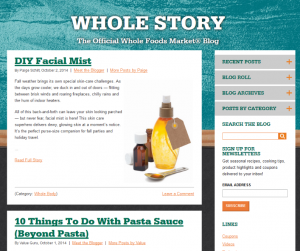 If the content of the company blog isn’t relevant to the target audience, that audience won’t visit and read it. Furthermore, if the content isn’t useful to them, they could click away with a negative perception of your brand in their minds. Bottom-line, irrelevant and useless blogs can actually damage your brand reputation, which can lead to negative word-of-mouth marketing and lost sales in the future. Instead, publish relevant and useful content that is highly shareable.
If the content of the company blog isn’t relevant to the target audience, that audience won’t visit and read it. Furthermore, if the content isn’t useful to them, they could click away with a negative perception of your brand in their minds. Bottom-line, irrelevant and useless blogs can actually damage your brand reputation, which can lead to negative word-of-mouth marketing and lost sales in the future. Instead, publish relevant and useful content that is highly shareable.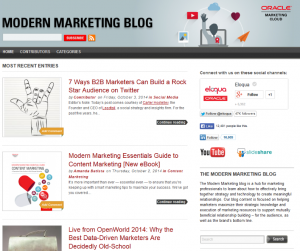 As with all social media marketing and content marketing, your blog content cannot be overly self-promotional. That doesn’t mean you can’t publish the occasional self-promotional blog post, but 80% of that post should be useful and no more than 20% should be self-promotional. In fact, the 80-20 rule should apply to all of your blog posts. Make sure that at least 80% of the posts you publish on your company blog are not self-promotional. If your blog reads like a series of ads or press releases, no one will stick around or visit again.
As with all social media marketing and content marketing, your blog content cannot be overly self-promotional. That doesn’t mean you can’t publish the occasional self-promotional blog post, but 80% of that post should be useful and no more than 20% should be self-promotional. In fact, the 80-20 rule should apply to all of your blog posts. Make sure that at least 80% of the posts you publish on your company blog are not self-promotional. If your blog reads like a series of ads or press releases, no one will stick around or visit again.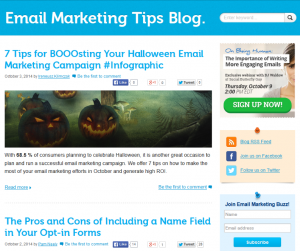 Avoid publishing the same type of blog post again and again. For example, if your brand is in the travel industry, avoid publishing post after post about the same travel destination. If your brand is in the email marketing industry, avoid publishing posts that are only about email marketing. Instead, go beyond the obvious content topics and look for indirectly related topics that can add variety and interest to your blog.
Avoid publishing the same type of blog post again and again. For example, if your brand is in the travel industry, avoid publishing post after post about the same travel destination. If your brand is in the email marketing industry, avoid publishing posts that are only about email marketing. Instead, go beyond the obvious content topics and look for indirectly related topics that can add variety and interest to your blog.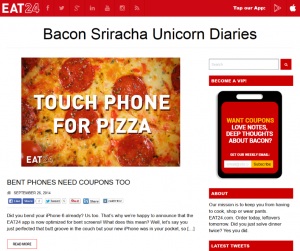 What is your brand personality? It should be reflected in your blog content. Your company blog should not read like a corporate document or an advertisement. It should read in a voice that will resonate with the audience and accurately reflects your brand personality. Of course, keep it professional!
What is your brand personality? It should be reflected in your blog content. Your company blog should not read like a corporate document or an advertisement. It should read in a voice that will resonate with the audience and accurately reflects your brand personality. Of course, keep it professional!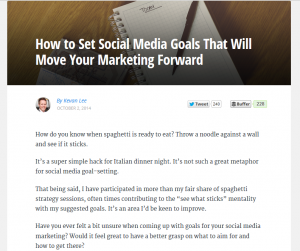 The user experience on your company blog must be reflective of your brand promise. For example, your company blog should be visually appealing and match your brand image. It should load quickly and be updated often to keep visitors coming back and to motivate them to tell their friends about it.
The user experience on your company blog must be reflective of your brand promise. For example, your company blog should be visually appealing and match your brand image. It should load quickly and be updated often to keep visitors coming back and to motivate them to tell their friends about it.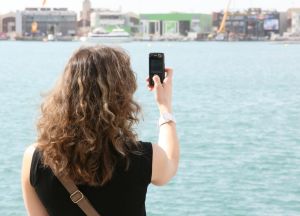 Do you use Instagram for brand marketing? While it’s not the top social media tool used for marketing, it can be very effective in building brand awareness, communicating brand experiences, and developing brand perceptions among consumers.
Do you use Instagram for brand marketing? While it’s not the top social media tool used for marketing, it can be very effective in building brand awareness, communicating brand experiences, and developing brand perceptions among consumers.